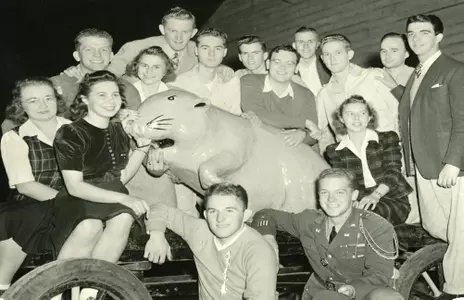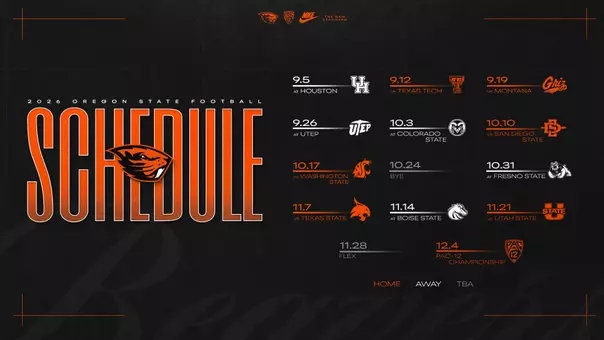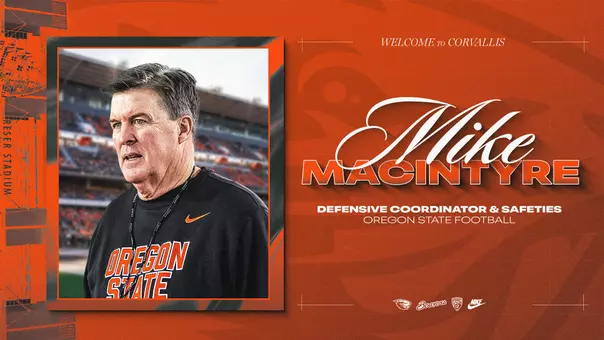
Remembering the Men of Roses -- "Let ‘em know you’re out there."
October 29, 2016 | Football
This is the sixth installment of a seven-part series written by Kip Carlson about the 1941 Oregon State football team that played in the 1942 Rose Bowl. The '42 Rose Bowl is the only one in the history of the storied game that was played outside of Southern California due to fears of an attack on the U.S. West Coast following Pearl Harbor.
This story will appear in the football game-day program Saturday, Nov. 19 vs. Arizona
The morning of January 1, 1942, people across the United States got up and, peering through the haze of the night before or looking ahead to what the coming year might bring, picked up their morning newspaper. When they got to the sports section, the Associated Press dispatch from Durham, N.C., acknowledged what most of the country felt about the coming afternoon's Rose Bowl game: Duke was a lock to beat Oregon State.
The Beavers were 3-to-1 underdogs, and AP sportswriter Sid Feder summed it up thusly in a story published New Year's Day: "The wizardry of (Duke head coach Wallace) Wade and the way his warriors steam-rollered nine opponents, burying each under a two-touchdown-or-better rockpile, makes Duke the lop-sided favorite for this clambake."
After all, while second-ranked Duke was unbeaten and untied, Oregon State's road to the Rose Bowl was rougher – and eventually longer. The Beavers had lost twice in their first four games before rebounding with four straight shutouts and then a 12-7 win at Oregon to clinch the first Rose Bowl berth in school history. In that era, the host team selected its opponent and the Beavers secured the toughest they could find in Duke.
The celebrations in Corvallis and around Oregon hadn't yet subsided and the planning for Pasadena had just begun when, on the morning of December 7, Japan bombed Pearl Harbor to draw the United States into a long-anticipated war. Citing fears of a Japanese attack on a target as inviting as a gathering of 100,000 football fans, military officials scuttled the Rose Bowl and accompanying activities.
Duke quickly offered to host the game and Oregon State and the Tournament of Roses committee just as quickly accepted. So rather than the Blue Devils crossing the country for the game, it was the Beavers heading east to North Carolina, stopping to practice and see the sights in Chicago and Washington, D.C. along the way.
Now game day was here and Duke was ready to celebrate.
"This end of Dixie was definitely on a merry-go-round yesterday," Feder wrote. "You could as soon get the U.S. mint as a hotel room. Kids marched the streets hawking everything from Rose Bowl souvenirs to sandwiches. The town was decked out like your best girl on Easter Sunday. Hotel lobbies needed traffic cops. It was Louisville on Derby day, Times Square on New Year's Eve. In short, it was the big show, and the curtain was going up."
Duke Stadium was sold out, with 56,000 fans cramming both the permanent seats and temporary bleachers brought in from nearby colleges. And they were wet, as a cold rain fell on a dreary day – familiar weather for the Beavers. Not far away, in Washington, D.C., representatives of 26 Allied nations were signing a pact that none of them would reach a separate peace agreement with any of the Axis powers.
In the Oregon State locker room before kickoff, head coach Lon Stiner told his players, "Let 'em know you're out there on the first three plays – give them everything you have." In actuality, it took only one play for the Beavers to deliver a message.On the opening kickoff at 2 p.m., Duke's Tommy Davis fielded the ball and headed upfield; at the 28-yard line, OSC's Lloyd Wickett, a tackle from Aberdeen, Wash., hit Davis hard enough to separate him from the football before Wickett bounced backward and George Peters, a back from Ventura, Calif., recovered for the Beavers.
Wickett had been nursing a sore right shoulder and that was the one that delivered the blow, but after the game Wickett said, "Do you know I never even felt it? After that I just forgot all about the shoulder. By the way, that was the hardest I ever hit anyone – the hardest I ever got hit."
Oregon State couldn't capitalize on that turnover, but opened the scoring later in the first quarter with a 52-yard drive; halfback Don Durdan scored from 15 yards out after freezing the Duke defense by faking a pass.Duke tied the game in the second quarter and it was 7-7 at halftime. The bands from local schools on hand for the game weren't allowed to take to the deteriorating field for halftime, but the Beavers and Blue Devils found their footing for a wild stretch in the third quarter – three touchdowns in a four-minute span.
First, Oregon State scored on a three-play, 55-yard drive that included Gene Gray, the back from Portland, sweeping left for 24 yards and Bob Dethman, the halfback from Hood River, passing 30 yards to George Zellick, an end from Lewiston, Mont., for the touchdown. After Duke knotted the score 14-14 on its next possession, Dethman found Gray for 68 yards and a touchdown; wrote Bill Peeler of the Salisbury, N.C. Post: "It was beautiful to watch Gene Gray take Dethman's 33-yard pass on the dead run in the closing minutes (of the third quarter), screech on the brakes to let the charging Moffatt Storer (of Duke) flash by and out of the play, and then pivot and race to the goal for his team's last touchdown." The conversion failed, leaving the Beaver lead 20-14. Duke managed a safety late in the fourth quarter to draw within 20-16, but the Blue Devils couldn't overtake the Beavers. When the final gun sounded, the plaudits began.
"Scoffed at as a feeble team on the Pacific Coast, Oregon State College's dauntless Beavers sprang one of the football upsets of the age here today by defeating mighty Duke, 20 to 16, in the transplanted Rose Bowl game," wrote Bob Considine of International News Service. "Like streaks of gold lightning splitting the drab drizzle which dampened 56,000 spectators, the orange-clad Beavers out-ran, out-passed and outsmarted the Duke team which had gone through its season unbeaten and which had topped the United States in yards gained. Duke took the field a 1-to-3 favorite, cocky and assured, got hit with a bolt at the very start of the game and was never once in the lead."
The Beavers outgained Duke 302-295 in total yards, including a 148-73 edge in the air. Durdan's performance running, passing and punting earned him Most Valuable Player honors; wrote Peeler: "Durdan is a very clever lad with a good change of pace and the ability to put on phenomenal bursts of speed. He'd break out around end, and a big Blue Devil would be right in his path. A pause, a shake of the hips, a flash of speed, and the Duke would be sprawling ineffectively on his ear while Durdan galloped into the secondary."
Stiner was able to deliver the equivalent of an "I told you so" as he spoke with reporters. Said the Beaver boss: "I guess everybody knows now that we play in a mighty tough league. The boys played fine football. I think we looked pretty good out there against a great Duke team."
As for the Beavers themselves, one newspaper story offered, "The players, who came through the battle with only minor bruises, were too tired to be hilarious in the dressing room, but complacent grins told their reaction." They also had a visitor: Wade, who told them, "You played a nice game, boys. A mighty nice game. Congratulations to you all."
Legendary sportswriter Grantland Rice gave credit to Duke's talent and record, then noted in his nationwide column: "Against this Duke angle, Lon Stiner and his Oregon State troupers knew only the hard way.
"They had never before won a Rose Bowl chance. They opened their season by a defeat from Southern California. They had to battle against odds week after week. They had known no oasis in the desert of hard competition. Then Oregon State went to Durham with the odds 4-to-1 against them. I figured Duke's 1941 schedule rated Duke a 6-to-5 choice. No better.
"I think (head coach) Maj. Swede Larson of the Navy and the Marines called the turn between halves at Durham when he said, 'you can see that Duke is being hit harder and keener than at any time during the season. Duke doesn't seem to be quite used to this.'
"That was the answer. I rode back West with the Oregon Staters. They were a strong, husky-looking bunch who gave you the idea they had been used to hard battling – and could give it and take it. They had been hit hard all season, while Duke had been on a flock of picnics, largely in soft meadows."
Oregon State stayed in Durham for a postgame banquet with the Duke squad, then boarded a train west at 12:40 a.m. Having taken the northern route east, the Beavers would head home through the southern states.Their first stop was in New Orleans, where the OSC party watched the East-West Shrine All-Star Game on January 3; that contest had also been moved from its usual San Francisco site due to the war. The next two days, as the Beavers continued through Louisiana, Texas and New Mexico, American and Philippine forces formed a defensive line against the Japanese at the base of the Bataan Peninsula.
January 6, the Beavers passed through Arizona and into California. That afternoon, they got a look at the Rose Bowl stadium in which they were to have played. By nightfall, they were headed north toward home. It took over a day to traverse the length of California and make it through southern Oregon. Durdan, the Rose Bowl MVP, wouldn't be with the Beavers when they got home; he got off the train near his hometown of Eureka to visit his family. Warren Simas did likewise to see his kin in Arcata. Half a world away, the Soviet army had halted Germany's advance toward Moscow and began pushing the invaders back westward.
On January 8, the Beavers' train arrived in Albany around 5:30 a.m. – the conclusion of a 7,384-mile round trip.Stiner was absent – he had headed to Nebraska after the game to visit family – so leading the way off the train were assistant coaches Jim Dixon and Hal Moe..
Reported the Oregon Journal, "although the players and managers definitely showed strains of the cross-nation trip, the smiles that split the faces of the players, stacked end to end, would have reached the sun."
The Beavers were treated to breakfast by the Albany Chamber of Commerce, then each player, coach and manager was taken by car to Corvallis in an "auto caravan, which strung out nearly the entire distance between the two towns," the Journal stated. In a large downtown rally, they were presented with a key to the city in front.
A ceremony in the Men's Gymnasium (now Langton Hall) at noon drew a packed house; Oregon State classes had been suspended for the day, and the celebration on campus and around Corvallis lasted all afternoon and into the night – to the degree that blackout conditions would allow, at any rate; no lights were allowed visible outdoors after dark, in the event that Japanese planes might be looking for targets.
Once Stiner returned to campus, the entire team was feted as a group with a January 16 banquet in the Memorial Union, wrapping up the greatest football season Oregon State had ever seen.
Now it was time to move on to other things. In the coming weeks and months, of the 31 players on Oregon State's Rose Bowl roster, 29 would serve in the United States military, many seeing combat - but taking an indelible memory of home with them to the European or Pacific theaters.
"I'm going in (the U.S. Army Air Corps) ," guard Martin Chaves from Baker, the Beavers' captain for the game, had told reporters after the contest in Durham. "I can die happy. That's what winning a Rose Bowl game means to a fellow."















